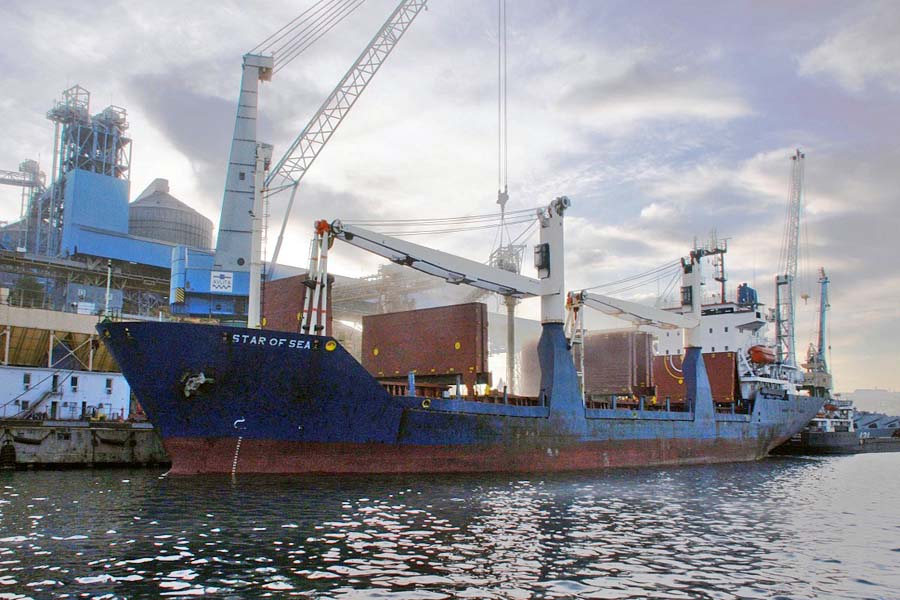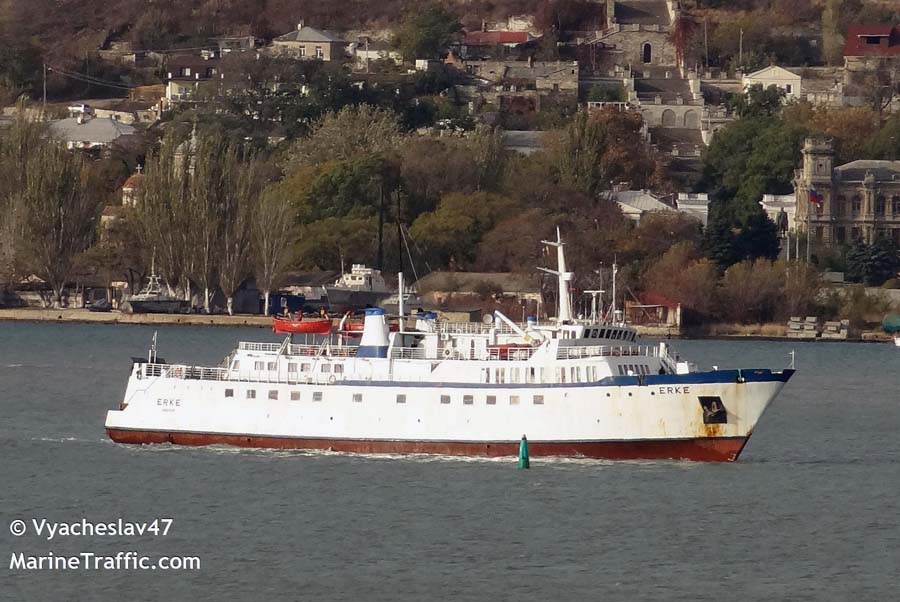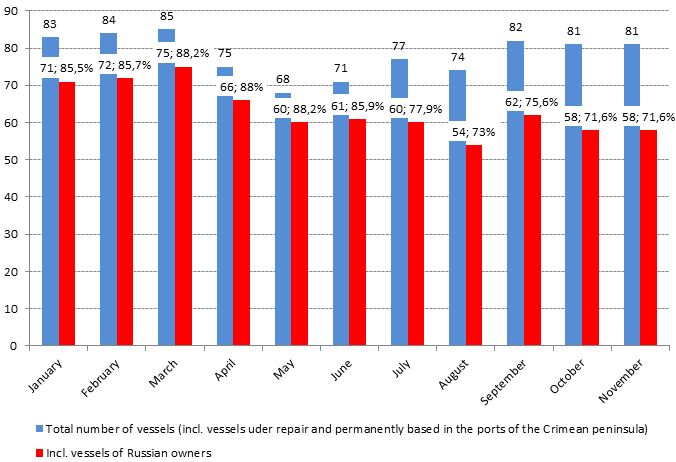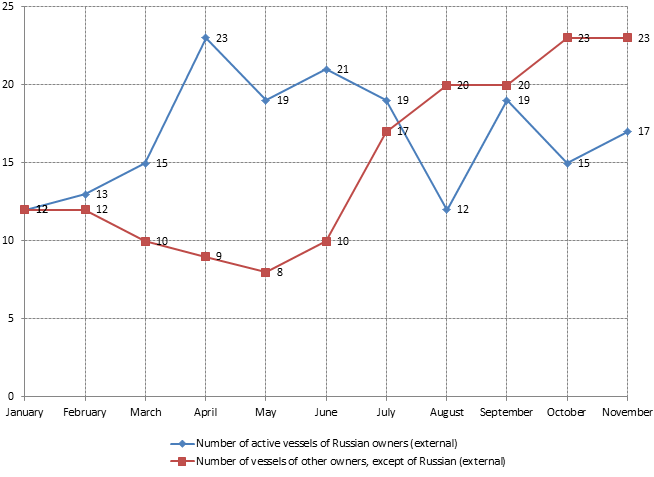Violation of the Crimean Maritime Sanction in September-October 2017: the Lebanese-Egyptian Fleet
 Egyptian dry cargo ship STAR OF SEA Flag: Panama, IMO: 9120736, Ship manager/Commercial manager: SEA GATE MANAGEMENT, Suez, Egyp, gets a load of grain for Cyprus at the Sevastopol’s Avlita grain terminal, October 2, 2017.
Egyptian dry cargo ship STAR OF SEA Flag: Panama, IMO: 9120736, Ship manager/Commercial manager: SEA GATE MANAGEMENT, Suez, Egyp, gets a load of grain for Cyprus at the Sevastopol’s Avlita grain terminal, October 2, 2017.
By Andii KLYMENKO
Head of the BSNews and Maidan of Foreign Affairs monitoring group,
Black Sea Institute of Strategic Studies Expert,
Editor-in-chief of the BlackSeaNews, Yalta-Kyiv
Translated by Tetyana PUCHKOVA
The Black Sea Institute of Strategic Studies, BSNews and Maidan of Foreign Affairs monitoring group continues to publish our monitoring results of the vessel violations of the Ukrainian and international maritime sanctions regarding the Russia-occupied Crimea.
Below are the main trends of the situation between September 1 and October 31, 2017, as well as the summarized information since the beginning of 2017.
According to our data, as of November 1, 2017, the total of 323 seagoing vessels have violated the regime of the occupied territory and international sanctions in the ports of the Crimean peninsula since the date of its illegal annexation on March 18, 2014, All of them have been entered in the general database that is being updated daily.
As of September 1, 2017, the total number of offenders was 313 and as of May 1, 2017 - 299.
To adequately reflect the situation and the trends, the Monitoring Group identifies the following groups of infringing ships:
1. Vessels on lay up or repairs, i.e. those that do not provide transportation and merely "replenish the order package" of the Sevastopol and Kerch shipbuilding and ship repair enterprises;
2. Active vessels, i.e. those carrying out cargo and/or passenger transportation to Crimea from ports outside the Crimean peninsula. Those, in turn, are divided into the two categories:
2.1. Vessels permanently based in the ports of the Crimean peninsula - mainly ferries;
In June-October 2017, the ships that were constantly based in the ports of the Crimean peninsula included ferries (19), Sevastopol-based vessels engaged in the predatory sand extraction in the Bakalsky Spit region (4), passenger catamarans transferred from Sochi (2) and ships transferred to the Kerch port (3) - the total of 28 vessels.
2.2. External vessels, i.e. those carrying out transportation between the ports of the Crimean peninsula and the Russian Federation - except for the port of the Caucasus, which is a ferry crossing - and other foreign countries.
The Number of the Infringing Ships and Their RF and Other States Proprietorship
|
Month |
Total number of infringing ships, including permanently based and laid up |
Number of those owned by the RF companies |
Number of the active “external” perpetrators, except for those permanently based and laid up |
Number of the active “external” Perpetrators owned by the RF companies |
Number of the active “external” Perpetrators owned by the non-RF companies |
|
January |
83 |
71 |
24 |
12 |
12 |
|
February |
84 |
72 |
25 |
13 |
12 |
|
March |
85 |
75 |
25 |
15 |
10 |
|
April |
75 |
66 |
32 |
23 |
9 |
|
May |
68 |
60 |
27 |
19 |
8 |
|
June |
71 |
61 |
31 |
21 |
10 |
|
July |
77 |
60 |
36 |
19 |
17 |
|
August |
74 |
54 |
32 |
12 |
20 |
|
September |
82 |
62 |
39 |
19 |
20 |
|
October |
81 |
58 |
38 |
15 |
23 |
*) There are 28 Russian ferries and other active vessels permanently based in Crimea on average, 14-15 Russian Federation vessels per month in repair or long-term lay-up in the Crimean ports, all of them owned by Russian companies.
In September-October, the end of last summer’s tendency has increased, i.e., the number of "external" – non RF - foreign vessels entering the ports of the occupied Crimea for the banned export of Crimean products, has exceeded the number of Russian vessels transporting goods to Crimea.
Just as in August, in September 2017, there were 20 "external" foreign offenders. 19 of the vessels - except the 28 ferries and other vessels permanently based in Crimea 14 vessels in repairs - were Russian-owned.
The Total Number of Infringing Vessels, Including Permanently Based, Repaired and Laid Up.
The Total Number of Active Infringing Vessels, Excluding Permanently Based, Repaired and Laid Up by Months, 2017.
In September 2017, according to the country of registration, the first place among the perpetrators - not only in comparison with summer months but for the entire period of monitoring, in general - belonged to the "Lebanese merchant fleet" that provided 8 ships for the Crimean export. Thus, it bypassed the traditional "leaders" - the Turkish and Romanian shipowners who had sent only 5 vessels/each to the occupied Crimea. Another 2 ships were sent to the Crimean ports by the shipowners from Egypt.
In October 2017, this trend has not only continued, but also intensified. 8 infringing ships belonged to the companies from Lebanon, 6 – to Turkey, 5 – to Romania, 2 – to Egypt, 1 – to Syria and 1 – to Greece, 23 total. The RF shipowners, in addition to permanently based and repaired vessels - 43 in September and October, managed to send to the occupied Crimea 19 and 15 ships, respectively.
Overall, we can see a steady trend of the gradual replacement of the "Crimean foreign trade fleet" vessels from the European countries by those from North Africa and the Middle East.
In fact, all prohibited exports from the Crimean ports are currently carried by foreign – non-Russian - vessels. Russian shipowners do not want to risk, because most of them also have fleet on other routes and fear the proliferation of sanctions from the United States.
That is the result of the constantly rising pressure by the Ukrainian society, volunteers and domestic and foreign mass media in coordination with the state structures, diplomatic missions and law enforcement agencies of Ukraine on the relevant Romanian and Turkish bodies. In September 2017 the representatives of the Maidan of Foreign Affairs personally handed the respective materials to the Minister for Foreign Affairs of Romania, while the Prosecutor General of Ukraine and the Prosecutor of the Autonomous Republic of Crimea delivered those to the Attorney General and the Minister of Justice of Turkey.
Already on October 6, 2017, the authorities of the Chamber of Shipping of the Turkish Chamber of Commerce and Industry sent the "The Principles of Shipping in the Black Sea and Crimea" directive to all sea transport and port business providers indicating the need to "enact preventive measures that correspond to the foreign the policy of our country in relation to the restrictions imposed on vessel calls at the ports of Crimea.”
Turkish ports, maritime agents, operators and shipowners are officially informed that "ships arriving from the Crimean region and its ports are not allowed to enter our country (Turkey) and the permission to leave the ports of the region is not granted."
In addition, a rigid monitoring system is now in place there. "The control is exercised by requesting from ships the documents on the previous port exit and the logbook records on the exit from the previous port and accompanying the vessels upon the notification by the port authorities of the arrival of vessels from the Black Sea ports, as well as control through the use of all available systems and open resources (AIS, etc.) to check the fact that the ships in fact, arrived from the specified ports...
Moreover, the port authorities now must receive a written confirmation in the form of "We hereby declare and confirm that the last point of departure of this vessel that is calling at our port was not a Crimean port, that it does not go from this port to a Crimean port and that we do not engage in any customs or port or trade documents stamped "Crimea"... In case of establishing any facts to the contrary concerning any of the above, all the port costs of and legal liability lies falls on our body." Finally, the control and supervision of such vessels are to be carried out personally by the authorities of each Turkish port.
The introduction of this procedure is a consequence of what has become a widespread practice by the breachers to give the Turkish maritime and port authorities false information regarding their destination ports.
It is emphasized that "these actions must be applied in full and without exception, irrespective of the owner, the flags of the vessels and whether the latter are loaded or not."
It should be noted, however, that the October monitoring results come too early to draw conclusions as to whether these decisions of Turkey have taken effect. That should become clear in November 2017. But we anticipate that due to the spread of the information, the number of vessels owned by North Africans and Middle Easterners among the offenders may increase.
At the same time, it would be very important to watch the reaction of Turkish authorities to the circumventing schemes of the prohibitions that have already surfaced. For example, the infamous perpetrator Turkish ferry ERKE actually started a new ferry line Zonguldak – Kerch in October 2017:
 Turkish ferry ERKE arrives to the occupied Kerch on October 23, 2017
Turkish ferry ERKE arrives to the occupied Kerch on October 23, 2017
|
ERKE Flag: Tanzania Vessel type:
|
IMO: 7014581. MMSI:677038200. Callsign: 5IM482. Gross tonnage: 1,456 tons. Summer DWT: 452 tons. Build year: 1970. Builder: United Shipping Yard - Athens, Greece.
|
Class society: Maritime Lloyd Owner: Sari Denizcilik Nakliyat, Sultan Sokak 10/2, Kemerkaya Mah, 61200, Trabzon, Turkey Manager: Sari Denizcilik Nakliyat, Sultan Sokak 10/2, Kemerkaya Mah, 61200, Trabzon, Turkey ---- Ship manager/Commercial manager SARI DENIZCILIK NAKLIYAT Sultan Sokak 10/2, Kemerkaya Mah, 61030 Trabzon, Turkey. since 01/09/2004 Registered owner PASTEL HOLDINGS LTD Monrovia, Liberia. since 01/09/2004
|
Kerch: 01.10.17 - KMMP from Trabzon 14.10.17 – КМMP from Zonguldak, в АIS indicated Kavraz, on Oct.14 at about 07:57 turned off the AIS while in the strait at Kamysh Burun, entered KMMP, On Oct.17 – transshipment station 451, de-facto stayed in the Azov Sea, then at the transshipment station south of the strait, after which returned to #451. On Oct.21 arrived to Zonguldak empty. left on Oct.26 for Zonguldak via the registration for Kavkaz port.
|
Finally, the maritime sanctions also have a growing effect on the flag registration or rather, revoking thereof.
For example, GRACE (IMO: 8403337) owned by a shipowner from Lebanon that on September 28 called at the occupied Sevastopol under the flag of Moldova, several days later had its flag registration canceled by the Moldovan authorities. As a result, the shipowner was forced to immediately register the vessel under a different name and the Tanzanian flag already during its return journey from Sevastopol to the Syrian port of Tartus.
The Black Sea Institute of Strategic Studies, BSNews and Maidan of Foreign Affairs monitoring group also regularly monitors the subsequent movement of aircrafts that illegally fly to the occupied Crimea. We can confirm that a number of them also provide passenger traffic to the European countries that have condemned the Russian annexation of Crimea. The database of those aircrafts is being continuously updated and expanded. Previous monitoring results can be found in the Black Sea Institute of Strategic Studies, BSNews and the Maidan of Foreign Affairs monthly air traffic reviews.
* * *
The monitoring of the violations of the international sanctions against Russia and the legal regime of the temporarily occupied territory of Crimea is supported by the European Program Initiative of the Renaissance International Foundation. The position of Renaissance International Foundation may differ from the opinion of the authors.
More on the topic
- 27.03.2020 The (Un)Foreseen Storm-2 – from Crimea to Odesa. Maritime Risks in 2020: The Black Sea
- 11.12.2018 Russia's Economic War Against Ukraine in the Sea of Azov as of December 1, 2018: The Technology of Blocking the Mariupol and Berdyansk Ports
- 13.07.2018 Illegal Visits of Foreign Citizens to the Territory of the Occupied Crimea in Ferbruary-May 2018 — the Monitoring Results
- 04.06.2018 Database of the Russian Airlines that Flew to the Occupied Crimea in May 2018
- 03.03.2018 Illegal Visits of Foreign Citizens to the Territory of the Occupied Crimea in December 2017-January 2018 — the Monitoring Results
- 27.02.2018 The Illegal Mining of Natural Resources in Crimea. Part 2. The Development of the Stolen Sea
- 23.02.2018 The Illegal Mining of Natural Resources in Crimea. Part 1. The Development of the Stolen Shelf
- 13.01.2018 Ilmenite Cargo Reloaded in the Kerch Strait onto the German Ship Again
- 27.12.2017 German Ship Delivers 10,000 Tons of Ilmenite from Norway to the Occupied Crimea’s Titan Plant – a BSNews Investigation
- 26.12.2017 Illegal Visits of Foreign Citizens to the Territory of the Occupied Crimea in October 2017 – Monitoring Results
- 19.12.2017 November 2017 Violations of the Crimea Maritime Sanctions: Grain Export and Cement and Ilmenite Import
- 15.12.2017 The Illegal Visits of Foreign Citizens to the Occupied Crimea in September 2017 - the Monitoring Results.

